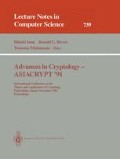Abstract
We present an interactive zero-knowledge proof for the discrete logarithm problem which is based on smooth numbers. The main feature of our proof is its communication complexity (number of messages exchanged, number of bits communicated) which is less than that of competing schemes.
Supported in part by NSF Grant NCR-9004879 and NSF Grant NCR-9106327.
Research carried out while visiting the University of Wisconsin — Milwaukee.
Preview
Unable to display preview. Download preview PDF.
References
L. M. Adleman and K. S. McCurley. Open problems in number theoretic complexity. In D. Johnson, T. Nishizeki, A. Nozaki, and H. Wilf, editors, Discrete Algorithms and Complexity, Proceedings of the Japan-US Joint Seminar (Perspective in Computing series, Vol. 15), pp. 263–286. Academic Press Inc., Orlando, Florida, June 4–6, Kyoto, Japan 1986.
G. Brassard and P. Bratley. Algorithmics — Theory & Practice. Prentice Hall, 1988.
M. Burmester, Y. Desmedt, and T. Beth. Efficient zero-knowledge identification schemes for smart cards. Accepted for publication in special issue on Safety and Security, The Computer Journal, February 1992, Vol. 35, No. 1, pp. 21–29.
T. Beth. A Fiat-Shamir-like authentication protocol for the El-Gamalscheme. In C. G. Günther, editor, Advances in Cryptology, Proc. of Eurocrypt '88 (Lecture Notes in Computer Science 330), pp. 77–84. Springer-Verlag, May 1988. Davos, Switzerland.
M. Bellare, O. Goldreich, and S. Goldwasser. Randomness in interactive proofs. In 31th Annual Symp. on Foundations of Computer Science (FOCS), pp. 563–572. IEEE Computer Society Press, October 22–October 24, 1990. St. Louis, Missouri.
M. Bellare, S. Micali, and R. Ostrovsky. Perfect zero-knowledge in constant rounds. In Proceedings of the twenty second annual ACM Symp. Theory of Computing, STOC, pp. 482–493, May 14–16, 1990.
D. Chaum, J.-H. Evertse, and J. van de Graaf. An improved protocol for demonstrating possession of discrete logarithms and some generalizations. In D. Chaum and W. L. Price, editors, Advances in Cryptology — Eurocrypt '87 (Lecture Notes in Computer Science 304), pp. 127–141. Springer-Verlag, Berlin, 1988. Amsterdam, The Netherlands, April 13–15, 1987.
D. Coppersmith, A. Odlyzko, and R. Schroeppel. Discrete logarithms in GF(p). Algorithmica, pp. 1–15, 1986.
W. Diffie and M. E. Hellman. New directions in cryptography. IEEE Trans. Inform. Theory, IT-22(6), pp. 644–654, November 1976.
T. ElGamal. A public key cryptosystem and a signature scheme based on discrete logarithms. IEEE Trans. Inform. Theory, 31, pp. 469–472, 1985.
U. Feige, A. Fiat, and A. Shamir. Zero knowledge proofs of identity. Journal of Cryptology, 1(2), pp. 77–94, 1988.
A. Fiat and A. Shamir. How to prove yourself: Practical solutions to identification and signature problems. In A. Odlyzko, editor, Advances in Cryptology, Proc. of Crypto '86 (Lecture Notes in Computer Science 263), pp. 186–194. Springer-Verlag, 1987. Santa Barbara, California, U. S. A., August 11–15.
S. Goldwasser, S. Micali, and C. Rackoff. The knowledge complexity of interactive proof systems. Siam J. Comput., 18(1), pp. 186–208, February 1989.
L. C. Guillou and J.-J. Quisquater. A practical zero-knowledge protocol fitted to security microprocessor minimizing both transmission and memory. In C. G. Günther, editor, Advances in Cryptology, Proc. of Eurocrypt '88 (Lecture Notes in Computer Science 330), pp. 123–128. Springer-Verlag, May 1988. Davos, Switzerland.
N. Jacobson. Basic Algebra I. W. H. Freeman and Company, New York, 1985.
J. Kilian, S. Micali, and R. Ostrovsky. Minimum resource zero-knowledge proofs. In 30th Annual Symp. on Foundations of Computer Science (FOCS), pp. 474–479. IEEE Computer Society Press, October 30–November 1, 1989. Research Triangle Park, NC, U.S.A.
A. Konheim. Cryptography: A Primer. John Wiley, Toronto, 1981.
J. L. Massey and J. K. Omura. A new multiplicative algorithm over finite fields and its applicability in public-key cryptography. Presented at Eurocrypt 83, Udine, Italy.
A. M. Odlyzko. Discrete logs in a finite field and their cryptographic significance. In N. Cot T. Beth and I. Ingemarsson, editors, Advances in Cryptology, Proc. of Eurocrypt 84 (Lecture Notes in Computer Science 209), pp. 224–314. Springer-Verlag, 1984. Paris, France April 1984.
S. C. Pohlig and M. E. Hellman. An improved algorithm for computing logarithms over GF(p) and its cryptographic significance. IEEE Trans. Inform. Theory, IT-24(1), pp. 106–110, January 1978.
C. P. Schnorr. Efficient identification and signatures for smart cards. In G. Brassard, editor, Advances in Cryptology — Crypto '89, Proceedings (Lecture Notes in Computer Science 435), pp. 239–252. Springer-Verlag, 1990. Santa Barbara, California, U.S.A., August 20–24.
A. Shamir. IP=PSPACE. In 31th Annual Symp. on Foundations of Computer Science (FOCS), pp. 11–15. IEEE Computer Society Press, October 22–October 24, 1990. St. Louis, Missouri.
R. Solovay and V. Strassen. A fast Monte-Carlo test for primality. SIAM Journal on Computing, 6(1), pp. 84–85, erratum (1978), ibid, 7,118, 1977.
M. Tompa and H. Woll. Random self-reducibility and zero-knowledge interactive proofs of possession of information. In The Computer Society of IEEE, 28th Annual Symp. on Foundations of Computer Science (FOCS), pp. 472–482. IEEE Computer Society Press, 1987. Los Angeles, California, U.S.A., October 12–14, 1987.
Author information
Authors and Affiliations
Editor information
Rights and permissions
Copyright information
© 1993 Springer-Verlag Berlin Heidelberg
About this paper
Cite this paper
Desmedt, Y., Burmester, M. (1993). An efficient zero-knowledge scheme for the discrete logarithm based on smooth numbers. In: Imai, H., Rivest, R.L., Matsumoto, T. (eds) Advances in Cryptology — ASIACRYPT '91. ASIACRYPT 1991. Lecture Notes in Computer Science, vol 739. Springer, Berlin, Heidelberg. https://doi.org/10.1007/3-540-57332-1_31
Download citation
DOI: https://doi.org/10.1007/3-540-57332-1_31
Published:
Publisher Name: Springer, Berlin, Heidelberg
Print ISBN: 978-3-540-57332-6
Online ISBN: 978-3-540-48066-2
eBook Packages: Springer Book Archive

